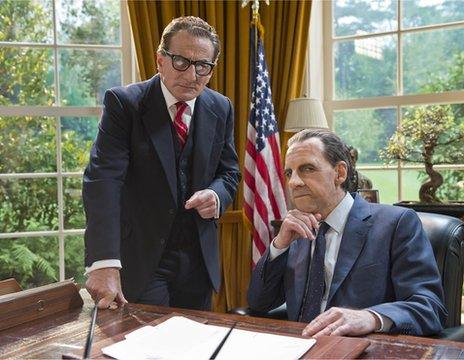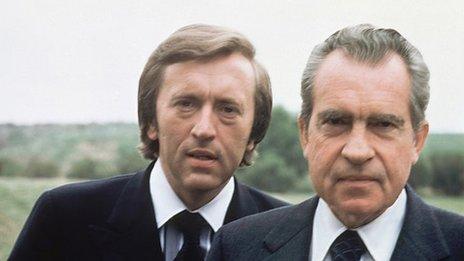Simpsons star Shearer portrays Nixon behind closed doors
- Published

Henry Goodman plays Henry Kissinger alongside Harry Shearer's Nixon
Harry Shearer is best known for providing the voice of Mr Burns in The Simpsons and as Derek Smalls in spoof rock band Spinal Tap. His next role sees him take on former US president Richard Nixon in a series based on the disgraced politician behind closed doors.
President Nixon's secret audio recordings became famous around the world as they eventually led to his downfall - becoming the first American president to resign - over his part in the Watergate scandal. But what most people don't know is that what was said in the other thousands of hours was also recorded.
Nixon's The One on Sky Arts sees Shearer almost unrecognisable in a silicone mask, performing verbatim the conversations that took place inside the Oval Office.
With each episode introduced by the late Sir David Frost, the series highlights Nixon's prejudices while also making the mundane, everyday life at 1600 Pennsylvania Avenue almost comical.
To borrow from Sir David's opening line - the following conversation was recorded by the BBC and these are the words actually spoken by Shearer and edited only for time.
Where did you get the idea for the series to be made for a British audience?
I'd known Stanley Cutler a long time - he's a professor of history at the University of Wisconsin. He's written two authoritative books on the tapes and filed the lawsuit to make them public. I listened to a lot of the tapes and found myself more and more entertained by them.
I called Stanley and said let's do a show that's not about Watergate, not about Vietnam, not about politics. We just know all these amazing conversations are there and he said okay.
The idea of doing a show that was verbatim based on these existing conversations and not subject to very much in the way of narrative tinkering would be much better received over here than the States.
I dreaded either the memo or the meeting I would get in the States that would go something like: "I know he didn't like black people, but does he have to hate Jews too?" We didn't have any of those conversations here, it is what it is. This is the material, it's strange, it's funny, it's scary and we're not trying to massage it in any way.
There's also the fact, based on my experience of doing stuff in America, there's very often a reluctance to go all the way with accuracy - there's just this sense of "nobody will notice". Having a crew of people who didn't need to be argued into that position, who just got it and revelled in the ability to get it right was great.
Harry Shearer: "Nixon is funny because he is complicated"
Did you listen to the tapes thinking there was comedy in them or out of genuine interest?
I scampered as fast as my legs could take me to this weird little warehouse on the outskirts of Washington and ordered up every tape I could think of. The tapes are not easy to listen to, you need to pay the closest attention to make out what is going on, but then having heard the newsworthy ones I started digging deeper.
Did anything shock you?
He's full of hatreds - if you listen to him he doesn't like black people, he doesn't like Mexicans, he doesn't like Jews, he doesn't like homosexuals - I don't think he liked people basically. Which is an odd thing to say about somebody who goes into politics - normally they love being surrounded - it's part of the series of ironies and oddities about his personality.
As an actor I was always fascinated by watching him and seeing that he seemed to spend about 80% of his waking energy trying to suppress his emotional response to stuff and then the other 20% of blurting it out in the most odd and unforeseen situations.
How did you go about learning to be Nixon?
I've been doing him all my life - I was in a comedy group in the '70s where it was our job to do a sketch a day about this guy so I did him on the radio and in nightclubs. Over time I did a piece on an NBC show in the '90s - when he died I did a series of fictional tapes of Nixon in heaven with his dead aide Haldeman reacting to events on Earth. So I flattered myself into thinking I did a pretty good Nixon.
But to replicate the tapes in the same way, did you have to listen to them…
Again and again and again. In rehearsal we would all listen together and use those as a guide for how to perform - see where the pauses were, see what the inflections were, listen to the nuances.
Were there any specific Nixon mannerisms?
Nixon was fond of talking a lot about strength, [in Nixon's voice] "the manly virtues and what his problem with the gays was that they were soft and was always critical of softness" but as I watched Nixon in public I was struck frequently by - he has these little fly -away, sort of flighty hand gestures. He flutters his eyelashes a lot, he purses his lips as he's talking. There's an interesting juxtaposition between all the talk about strength and manliness and this array of gestures.
Do you think you understand Nixon any more now, or is he too complex?
It was really interesting - I've been fascinated by him all my life but there's nothing like this intense rehearsal process to really answer some questions. For example, the last scene in the last episode is the eight minutes before he quits the presidency and he walks into the Oval Office.
That scene was taped because of a blessed anonymous engineer who the minute Nixon walked into the room pushed the record button. So we've seen this through the eye of the camera, but he walks off and away from the microphones, so I went through the process of reclaiming those words.
But the behaviour always struck me as quintessentially odd - here's this guy with no gift for small talk, he's having the most humiliating moment of his life coming up - he walks in and what does he do? He engages in jokes with the crew - bad jokes, but jokes.
I always thought that was just weird behaviour and as we were rehearsing I realised what he was doing - he was already thinking about rebuilding his reputation and the first evidence that was going to be available to help him rebuild his reputation was the crew going: "He wasn't upset, he was joking, he was a nice guy." He was campaigning for his own rehabilitation, he was engaged in the next campaign.

In Sir David Frost's famous interviews with Richard Nixon in the 70s he admitted he had let the American people down. They were turned into a play and film
What's the one thing you want viewers to come away with after watching the series?
[Laughs] What a… crazy… strange… person you might have to be to be president of the United States. I personally think anybody who craves that office should by that very fact be disqualified from ever obtaining office.
Nixon was a particularly screwed-up guy burning with resentments - class resentments, all sorts of other resentments that he never let go of, which is what made him funny and strange.
But although he's the only guy we're going to have this kind of evidence of what went on in his office, I can't help thinking a lot of these scenes are being replayed in Oval Offices and Number 10s and other such places as we speak. It's in the nature of the beast.
The shame about the series is Sir David Frost introduces them all and he's not alive to enjoy it.
I know, it was heartbreaking. Sir David saw the pilot episode at a BFI screening and came up and said: "I love it, if you're going to go to series I'd love to be associated with it in some way." I had the great pleasure of working with him on the scripts and being present at the tapings and had some lovely conversations with him.
Everybody knows what a profoundly talented conversationalist he was, how insatiable his curiosity was and how eager he was to learn more and it was really, really fun to have him be part of the project. I was extremely sad that he didn't live to see it come to air.
Nixon's The One is on Sky Arts on Thursdays at 21:00 GMT.
- Published20 April 2012